Jane Austen's Books & Adaptations discussion
JA Yearly Challenge
>
Zuzana's Challenge Log 2024
date newest »
newest »
 newest »
newest »
message 1:
by
Zuzana
(last edited Jan 07, 2024 09:41AM)
(new)
Jan 07, 2024 09:41AM
 Mod
Mod
reply
|
flag
Jane Austen Yearly Challenge
Start Date: January 1st, 2024
Duration: 1 Year
Level: (view spoiler)
Current Total = X Points, X/6 Categories + bonuses X/3
I. Original: 2 points per book
II. Sequels & Re-tellings: 1 point per book
III. Setting: 1 point per book 1900+, 2 points per book pre-1900, 1 point per movie, 2 points per TV series
IV. Plain Facts: 3 points per book, 1 point per documentary
V. Spell-it-out: 1 point per book
E:
M:
M:
A:
VI. Adaptations: 1 point per movie or radio play, 2 points per TV series
BONUS Category:
VII. Jane Austen's Library: 2 point per book, +1 bonus point if author or book mentioned by JA
VIII. Jane Austen's Pianoforte: 1 point per CD/album, 2 points per concert, 3 points per opera
IX. Jane Austen's Literary Successors: 2 points per book
Start Date: January 1st, 2024
Duration: 1 Year
Level: (view spoiler)
Current Total = X Points, X/6 Categories + bonuses X/3
I. Original: 2 points per book
II. Sequels & Re-tellings: 1 point per book
III. Setting: 1 point per book 1900+, 2 points per book pre-1900, 1 point per movie, 2 points per TV series
IV. Plain Facts: 3 points per book, 1 point per documentary
V. Spell-it-out: 1 point per book
E:
M:
M:
A:
VI. Adaptations: 1 point per movie or radio play, 2 points per TV series
BONUS Category:
VII. Jane Austen's Library: 2 point per book, +1 bonus point if author or book mentioned by JA
VIII. Jane Austen's Pianoforte: 1 point per CD/album, 2 points per concert, 3 points per opera
IX. Jane Austen's Literary Successors: 2 points per book
January
Finished listening to Mrs. Wickham by Sarah Page

Lydia, Wickham, and other Bennets seemed out of character. The Bennets were painted as villains to make Lydia more of a victim. The redemption of one of the characters at the end was unconvincing. I would have loved it more if it was historical fiction with original characters. The audio cast was excellent and when I got over an occasional burst of rock music in the background I quite enjoyed the production.
2 stars for the story, audio production: 5 stars for the voice actors, -1 star for the music.
Overall: 3 stars.
Jessie Buckley [Mrs Lydia Wickham] and Johnny Flynn [Mr Wickham]
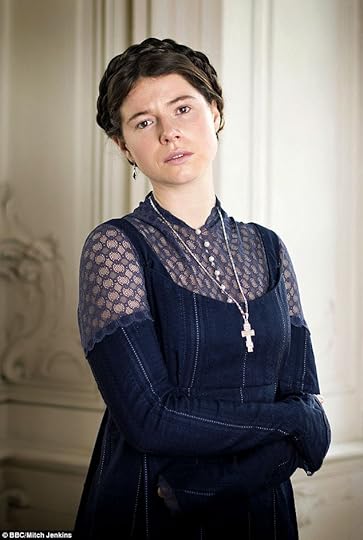
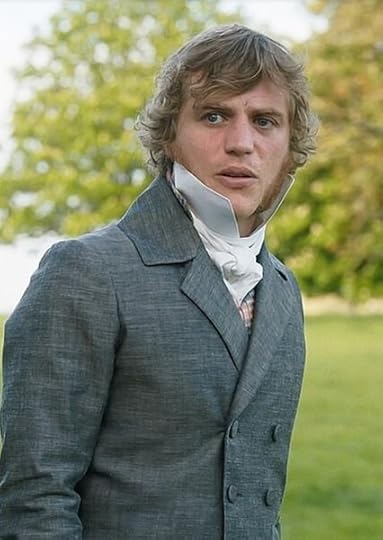
The Guardian review: https://www.theguardian.com/stage/202... (I totally agree with the last paragraph - see bellow.)
Category: Sequels & Re-tellings, 1 point
in progress
Jane on the Brain: Exploring the Science of Social Intelligence with Jane Austen by Wendy Jones
Jane Austen's Christmas: The Festive Season in Georgian England by Maria Hubert
Finished listening to Mrs. Wickham by Sarah Page

Lydia, Wickham, and other Bennets seemed out of character. The Bennets were painted as villains to make Lydia more of a victim. The redemption of one of the characters at the end was unconvincing. I would have loved it more if it was historical fiction with original characters. The audio cast was excellent and when I got over an occasional burst of rock music in the background I quite enjoyed the production.
2 stars for the story, audio production: 5 stars for the voice actors, -1 star for the music.
Overall: 3 stars.
Jessie Buckley [Mrs Lydia Wickham] and Johnny Flynn [Mr Wickham]


The Guardian review: https://www.theguardian.com/stage/202... (I totally agree with the last paragraph - see bellow.)
"Lydia sounds very modern – much like a 19th-century Bridget Jones – and Page’s story steers choppily between the Regency-era realities of an unfaithful marriage with no recourse to divorce that leaves a woman powerless, and the 21st-century need to provide a romantic ending in which love wins over all else. The latter requires a dramatic shift in Wickham’s rakish ways and gives us the happy ever after, but it may leave Austen fans utterly unconvinced."
Category: Sequels & Re-tellings, 1 point
in progress
Jane on the Brain: Exploring the Science of Social Intelligence with Jane Austen by Wendy Jones
Jane Austen's Christmas: The Festive Season in Georgian England by Maria Hubert
- Watched What the Austen podcast #55 on YT: Unpopular opinions vol. 3
- Listened to two episodes (#81 and 82) of The Thing About Austen: About the Gold Paper (Persuasion), About Astley's (Emma)
- Listened to two episodes (#81 and 82) of The Thing About Austen: About the Gold Paper (Persuasion), About Astley's (Emma)
- Listened to Reading Jane Austen podcast (Harriet and Ellen) Season 4 Episode 8, Emma Chapters 37 to 41 (view spoiler)
Another JA podcast I like. This is great when you read along. Only downside, they post 1 episode a month. So it's quite slowgoing.
You can listen to all of the episodes here: https://readingjaneausten.com/
- Listened again to: The Thing About Austen Episode 76 - The Thing About Harriet's Sore Throat with guest Dr. Rena Jones
Another JA podcast I like. This is great when you read along. Only downside, they post 1 episode a month. So it's quite slowgoing.
You can listen to all of the episodes here: https://readingjaneausten.com/
- Listened again to: The Thing About Austen Episode 76 - The Thing About Harriet's Sore Throat with guest Dr. Rena Jones
Watched Breakfast in Jane Austen's England on Tasting History with Max Miller YT Channel, contains Bath Buns recipe demonstration. (24 min)
https://youtu.be/ugi_ZNm-gbs?si=ncYWQ...
https://youtu.be/ugi_ZNm-gbs?si=ncYWQ...
- I'm going to listen to the Czech radio drama adaptation of Persuasion.
Anna Elliotová (12 episodes, Celková délka: 05:35:44)
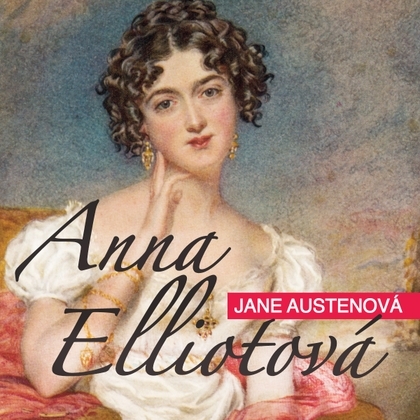
"Klasický společenský román o ztracené a znovunalezené lásce, kterou hrdinka získává díky své inteligenci, vtipu a morální pevnosti. Autorka líčí život anglické střední třídy, její zájmy, zábavy, každodenní činnosti, ale také vztahy mezi rodiči a dětmi, mezi sestrami i mezi muži a ženami."
"Účinkují: Růžena Merunková, Hana Kofránková
Připravila: Eva Ruxová
Napsala: Jane Austenová
Překlad: Eva Ruxová
Režie: Markéta Jahodová
Natočeno: 1995"
Anna Elliotová (12 episodes, Celková délka: 05:35:44)

"Klasický společenský román o ztracené a znovunalezené lásce, kterou hrdinka získává díky své inteligenci, vtipu a morální pevnosti. Autorka líčí život anglické střední třídy, její zájmy, zábavy, každodenní činnosti, ale také vztahy mezi rodiči a dětmi, mezi sestrami i mezi muži a ženami."
"Účinkují: Růžena Merunková, Hana Kofránková
Připravila: Eva Ruxová
Napsala: Jane Austenová
Překlad: Eva Ruxová
Režie: Markéta Jahodová
Natočeno: 1995"
It's more of a translation/audiobook than a radio drama. It's read by one actress/a narrator. They used new (their own) translation, and the translator did several minor and tasteful alterations (cuts and add-ons), mostly for clarity. Overall, it's a very sensitive interpretation of the story.
I'm about halfway through, and although I've read the book many times the Lyme accident was done here so well that I shed a tear listening to the description of everyone's reactions.
I'm about halfway through, and although I've read the book many times the Lyme accident was done here so well that I shed a tear listening to the description of everyone's reactions.
Finished Anna Elliotová on Monday. Loved it very much. A lovely translation and sensitive cuts. I know the book really well and nothing important was lost (and several tiny additions made it even better).
Category: Adaptations, 1 point
Category: Adaptations, 1 point
Started listening to a Spotify Original Pride and Prejudice reimagining in a scripted podcast format. (10 episodes/chapters)

"In this modern interpretation of the Jane Austen classic, Bennet, a 30-something, non-committal gay man struggles to find belonging when his chosen family suddenly begins coupling up and settling down."
Gay Pride & Prejudice, created, written, and directed by Zackary Grady. Starring Jesse Tyler Ferguson, Blake Lee, Sherry Cola, Vella Lovell, Javier Munoz, Rhys Nicholson, Maulik Pancholy, Ronald Peet, Matthew Risch, Marisol Sacramento, and Rosie O’Donnell.
Executive producer Mimi O’Donnell, Jesse Tyler Ferguson, and Justin Mikita. Senior producer Katie Pastore. Associate producers Julie Balefsky and Kayla Stokes. Sound design and mix by Daniel Brunelle and Shane Hendrickson. Additional engineering by Gordon Bramli, Rob Smierciak, Armando Serrano, and Steven Tejeda. Recording by Armando Serrano and Steven Tejeda. Sound supervision by Daniel Brunelle and Jonathon Roberts. Music supervision by Liz Fulton. Score by Chris Ryan. Casting by Karyn Casl/The Telsey Office.
Chapters: (my progress: 10/10)
I. Carlos - Marriage Equality passes. A gay celebrity comes to town.
II. James - Bennet goes to rescue James. Darcy interrogates Bennet.
III. Colin - Colin inserts himself in Bennet’s family. Bennet’s hookup reveals a secret.
IV. Wickham - Carlos throws a pool party. Bennet gets locked inside a room with Darcy.
V. Charlotte - Charlotte has news. James has news. Bennet is overwhelmed.
VI. Darcy - A trip to visit Colin brings Bennet closer to Darcy. Bennet makes a huge mistake.
VII. Luke - Luke has news. Bennet goes to San Francisco.
VIII. Mary - Bennet and Mary run into Darcy. There’s a problem with Luke.
IX. Carolina - Luke is missing. James gets a surprise. Carolina calls Bennet.
X. Bennet - Bennet’s family evolves.
Summary by the author (Grady):
In this modern retelling, “the Bennet sisters” are a circle of best friends in Boston’s LGBTQ+ community, with Blake Lee’s Bennet in the central “Lizzy” role and Rosie O’Donnell’s lovably neurotic Mrs. B as the mother figure. The first episode sees Bennet trying to gather everyone at Mrs. B’s house after her wife’s funeral; but the news of Obergefell v. Hodges passing and the unexpected arrival of gay celebrity Carlos Bingley (Muñoz) draws them to a local nightclub, where Bennet meets Bingley’s snobbish friend Darcy Williams (Peet), a newly out NFL star.
“In the beginning, [Bennet] is so focused on his chosen family and keeping them all together, and they’re all evolving and growing up,” Lee said. “It’s that time in your early 30s when some of your friends are getting married and some of your friends are having kids, and [he’s] the single person whose chosen family is everything, it’s his whole world.”

"In this modern interpretation of the Jane Austen classic, Bennet, a 30-something, non-committal gay man struggles to find belonging when his chosen family suddenly begins coupling up and settling down."
Gay Pride & Prejudice, created, written, and directed by Zackary Grady. Starring Jesse Tyler Ferguson, Blake Lee, Sherry Cola, Vella Lovell, Javier Munoz, Rhys Nicholson, Maulik Pancholy, Ronald Peet, Matthew Risch, Marisol Sacramento, and Rosie O’Donnell.
Executive producer Mimi O’Donnell, Jesse Tyler Ferguson, and Justin Mikita. Senior producer Katie Pastore. Associate producers Julie Balefsky and Kayla Stokes. Sound design and mix by Daniel Brunelle and Shane Hendrickson. Additional engineering by Gordon Bramli, Rob Smierciak, Armando Serrano, and Steven Tejeda. Recording by Armando Serrano and Steven Tejeda. Sound supervision by Daniel Brunelle and Jonathon Roberts. Music supervision by Liz Fulton. Score by Chris Ryan. Casting by Karyn Casl/The Telsey Office.
Chapters: (my progress: 10/10)
I. Carlos - Marriage Equality passes. A gay celebrity comes to town.
II. James - Bennet goes to rescue James. Darcy interrogates Bennet.
III. Colin - Colin inserts himself in Bennet’s family. Bennet’s hookup reveals a secret.
IV. Wickham - Carlos throws a pool party. Bennet gets locked inside a room with Darcy.
V. Charlotte - Charlotte has news. James has news. Bennet is overwhelmed.
VI. Darcy - A trip to visit Colin brings Bennet closer to Darcy. Bennet makes a huge mistake.
VII. Luke - Luke has news. Bennet goes to San Francisco.
VIII. Mary - Bennet and Mary run into Darcy. There’s a problem with Luke.
IX. Carolina - Luke is missing. James gets a surprise. Carolina calls Bennet.
X. Bennet - Bennet’s family evolves.
Summary by the author (Grady):
In this modern retelling, “the Bennet sisters” are a circle of best friends in Boston’s LGBTQ+ community, with Blake Lee’s Bennet in the central “Lizzy” role and Rosie O’Donnell’s lovably neurotic Mrs. B as the mother figure. The first episode sees Bennet trying to gather everyone at Mrs. B’s house after her wife’s funeral; but the news of Obergefell v. Hodges passing and the unexpected arrival of gay celebrity Carlos Bingley (Muñoz) draws them to a local nightclub, where Bennet meets Bingley’s snobbish friend Darcy Williams (Peet), a newly out NFL star.
“In the beginning, [Bennet] is so focused on his chosen family and keeping them all together, and they’re all evolving and growing up,” Lee said. “It’s that time in your early 30s when some of your friends are getting married and some of your friends are having kids, and [he’s] the single person whose chosen family is everything, it’s his whole world.”
Cast of Gay Pride and Prejudice

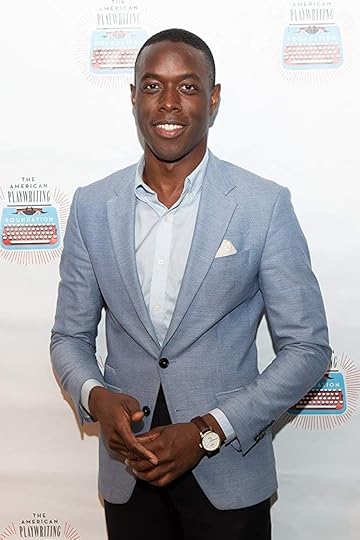
Bennet (Blake Lee) and Darcy Williams (Ronald Peet)
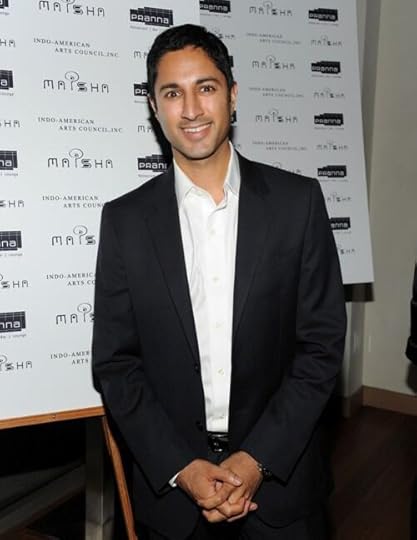

James (Maulik Pancholy) and Carlos Bingley (Javier Muñoz)
You can watch Javier singing Carlos Bingley's hit "Gimme Chicas": https://youtu.be/RcZ95REHm7I?si=tIT61...
EDIT: Finished Gay Pride and Prejudice 1/28/24
This was my second attempt at listening to it. The first two chapters (especially the first one) are way too chaotic. Last time I bailed out, I couldn't take the chaos. This time I stuck to it and it does get better. The problem is that it took 5 out of 10 episodes for me to really enjoy it. It's half of the production. Anyway, once you get over the initial shock, the number of characters per chapter decreases and the narrative takes a less frantic pace, it's a quite nice modern adaptation. The "Bennet sisters" is a group of uni friends, a chosen family if you like, now in their mid 30s. Bennet would like to keep his friend group as is, but it's time to grow up and not all change is bad. Set in 2015/2016 it's bookended by the legalization of gay marriage and Orlando gay nightclub mass shooting (both happening as historic events in the background, there's no violence in the story).
Overall 2.5 stars.
Category: Sequels & Re-tellings, 1 point


Bennet (Blake Lee) and Darcy Williams (Ronald Peet)


James (Maulik Pancholy) and Carlos Bingley (Javier Muñoz)
You can watch Javier singing Carlos Bingley's hit "Gimme Chicas": https://youtu.be/RcZ95REHm7I?si=tIT61...
EDIT: Finished Gay Pride and Prejudice 1/28/24
This was my second attempt at listening to it. The first two chapters (especially the first one) are way too chaotic. Last time I bailed out, I couldn't take the chaos. This time I stuck to it and it does get better. The problem is that it took 5 out of 10 episodes for me to really enjoy it. It's half of the production. Anyway, once you get over the initial shock, the number of characters per chapter decreases and the narrative takes a less frantic pace, it's a quite nice modern adaptation. The "Bennet sisters" is a group of uni friends, a chosen family if you like, now in their mid 30s. Bennet would like to keep his friend group as is, but it's time to grow up and not all change is bad. Set in 2015/2016 it's bookended by the legalization of gay marriage and Orlando gay nightclub mass shooting (both happening as historic events in the background, there's no violence in the story).
Overall 2.5 stars.
Category: Sequels & Re-tellings, 1 point
I am reading Don Karlos: Infant von Spanien by Friedrich Schiller (in Czech). Published in 1787, it definitely could have been in Jane Austen's Library. :)
I'm reading it very slowly. Don Carlo/Don Carlos by Verdi is my favorite opera so I'm reading it and comparing it to the libretto and many many many different productions of the opera I have watched over the years.
Great productions for opera newbies:
french version: Don Carlos (Paris 1996 - Alagna, Matilla, Hampson)
italian version: Don Carlo (Salzburg 2014 - Kaufmann, Harteros, Hampson) or Don Carlo (San Francisco 2016 - Fabiano, Martínez, Kwiecien)
These are more or less traditional productions (the European ones tend to lean towards less props and more spare stage, the American one is supertraditional with the exception of flying heretics and the kiss).
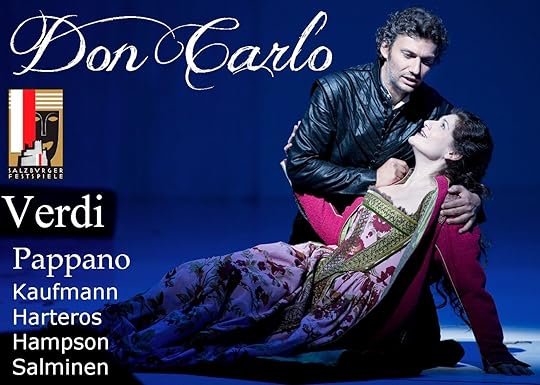
I'm reading it very slowly. Don Carlo/Don Carlos by Verdi is my favorite opera so I'm reading it and comparing it to the libretto and many many many different productions of the opera I have watched over the years.
Great productions for opera newbies:
french version: Don Carlos (Paris 1996 - Alagna, Matilla, Hampson)
italian version: Don Carlo (Salzburg 2014 - Kaufmann, Harteros, Hampson) or Don Carlo (San Francisco 2016 - Fabiano, Martínez, Kwiecien)
These are more or less traditional productions (the European ones tend to lean towards less props and more spare stage, the American one is supertraditional with the exception of flying heretics and the kiss).

Listening to:

The Jane Austen Companion, "a compilation from Nimbus, consists of music from the era of Jane Austen, composed between roughly 1760 and 1820. Some of it may have been what Austen heard at concerts attended during visits to her brothers in London or when her family lived in Bath. The mixture of composers on the album is made up of those who lived or occasionally worked in London, such as Mendelssohn, Haydn, and J.C. Bach, plus English composer Boyce and a few other contemporary, continental composers. Most of the music is single movements from symphonies or concertos and it's almost all slow or moderately paced, pleasant-sounding music without much emotional tension. Without a greater variety of music, the album as a whole brings to mind garden strolls and walks around assembly halls, which are certainly appropriate to Austen's work, but not really what it is known for. The only selections that are lively enough to hint at the wittiness of Austen's writing are an Allegro from Boyce's Symphony No. 1."
Track Listing
1. Mendelssohn: Sinfonia (String Symphony) for string orchestra No. 4 in C minor, MWV N4: Andante
2. Michael Haydn: Symphony in F major, MH 25: Andante
3. Fasch: Concerto for trumpet, oboe d'amore & violin in E major: Affettuoso
4. J. C. Bach: Symphony for double orchestra "No. 28" in E major, Op. 18/5, CW C28 (T. 270/10): Andante
5. Franz Joseph Haydn: Violin Concerto in C major, H. 7a/1: Adagio
6. Boyce: Symphony in F major, Op. 2/6: Larghetto
7. Franz Joseph Haydn: Cello Concerto No. 1 in C major, H. 7b/1: Adagio
8. Boyce: Symphony in B flat major, Op. 2/1: 1. Allegro
9. Boyce: Symphony in B flat major, Op. 2/1: 2. Moderato e dolce
10. Méhul: Symphony No. 3 in C major: Andante
11. Franz Joseph Haydn: Symphony No. 94 in G major ("Surprise"/"The Drumstroke"/"Mit dem Paukenschlag"), H. 1/94: Menuet & Trio
12. Schubert: Symphony No. 5 in B flat major, D. 485: Andante con moto
13. Boyce: Symphony in A major, Op. 2/2: Vivace
14. Franz Joseph Haydn: Trumpet Concerto in E flat major, H. 7e/1: Andante
15. Schubert: Symphony No. 1 in D major, D. 82: Andante
Listened to: 4th February, 2024 (Spotify)
Category: Jane Austen's Pianoforte, 1 point
This is not my preferred style of music. I'm all for 19th-century Italian and French opera and Tchaikovsky and Dvorak's big sweeping romantic melodies. This is more of a good calm background music for reading. Also, picking mostly Andante and Adagio movements makes for a sedate experience. :D
Note to self - listen to more of:
William Boyce (1711 – 1779) was an English composer and organist. Like Beethoven later on, he became deaf but continued to compose. He knew Handel, Arne, Gluck, Bach, Abel, and a very young Mozart, all of whom respected his work. As Master of the King's Musick Boyce had the responsibility of writing music for royal occasions including funerals, weddings and coronations. Famous works: Twelve sonatas for two violins, with a bass for the violoncello or harpsicord; Symphonies, Op. 2; Cathedral Music.
Johann Christian Bach (1735 – 1782) was a German composer of the Classical era, the eighteenth child of Johann Sebastian Bach, and the youngest of his eleven sons. After living in Italy for five years (1757–1762), Bach moved to London, where he became known as "The London Bach" or "The English Bach". He is noted for playing a role in influencing the concerto styles of Haydn and Mozart. He contributed significantly to the development of the new sonata principle.
Étienne Nicolas Méhul (French: [meyl]; 1763 – 1817) was a French composer of the late classical and early romantic periods. He was known as "the most important opera composer in France during the Revolution". He was also the first composer to be called a "Romantic". He is known particularly for his operas, written in keeping with the reforms introduced by Christoph Willibald Gluck and Wolfgang Amadeus Mozart.
Franz Joseph Haydn (1732 – 1809) was an Austrian composer of the Classical period. He was instrumental in the development of chamber music such as the string quartet and piano trio. His contributions to musical form have led him to be called "Father of the Symphony" and "Father of the String Quartet".
... Since the death of Johann Christian Bach in 1782, Haydn's music had dominated the concert scene in London; "hardly a concert did not feature a work by him". Both the 1791–1792 London journey, along with a repeat visit in 1794–1795, were greatly successful. Audiences flocked to Haydn's concerts; he augmented his fame and made large profits, thus becoming financially secure. Charles Burney reviewed the first concert thus: "Haydn himself presided at the piano-forte; and the sight of that renowned composer so electrified the audience, as to excite an attention and a pleasure superior to any that had ever been caused by instrumental music in England." Musically, Haydn's visits to England generated some of his best-known work, including the Surprise, Military, Drumroll and London symphonies; the Rider quartet; and the "Gypsy Rondo" piano trio.

The Jane Austen Companion, "a compilation from Nimbus, consists of music from the era of Jane Austen, composed between roughly 1760 and 1820. Some of it may have been what Austen heard at concerts attended during visits to her brothers in London or when her family lived in Bath. The mixture of composers on the album is made up of those who lived or occasionally worked in London, such as Mendelssohn, Haydn, and J.C. Bach, plus English composer Boyce and a few other contemporary, continental composers. Most of the music is single movements from symphonies or concertos and it's almost all slow or moderately paced, pleasant-sounding music without much emotional tension. Without a greater variety of music, the album as a whole brings to mind garden strolls and walks around assembly halls, which are certainly appropriate to Austen's work, but not really what it is known for. The only selections that are lively enough to hint at the wittiness of Austen's writing are an Allegro from Boyce's Symphony No. 1."
Track Listing
1. Mendelssohn: Sinfonia (String Symphony) for string orchestra No. 4 in C minor, MWV N4: Andante
2. Michael Haydn: Symphony in F major, MH 25: Andante
3. Fasch: Concerto for trumpet, oboe d'amore & violin in E major: Affettuoso
4. J. C. Bach: Symphony for double orchestra "No. 28" in E major, Op. 18/5, CW C28 (T. 270/10): Andante
5. Franz Joseph Haydn: Violin Concerto in C major, H. 7a/1: Adagio
6. Boyce: Symphony in F major, Op. 2/6: Larghetto
7. Franz Joseph Haydn: Cello Concerto No. 1 in C major, H. 7b/1: Adagio
8. Boyce: Symphony in B flat major, Op. 2/1: 1. Allegro
9. Boyce: Symphony in B flat major, Op. 2/1: 2. Moderato e dolce
10. Méhul: Symphony No. 3 in C major: Andante
11. Franz Joseph Haydn: Symphony No. 94 in G major ("Surprise"/"The Drumstroke"/"Mit dem Paukenschlag"), H. 1/94: Menuet & Trio
12. Schubert: Symphony No. 5 in B flat major, D. 485: Andante con moto
13. Boyce: Symphony in A major, Op. 2/2: Vivace
14. Franz Joseph Haydn: Trumpet Concerto in E flat major, H. 7e/1: Andante
15. Schubert: Symphony No. 1 in D major, D. 82: Andante
Listened to: 4th February, 2024 (Spotify)
Category: Jane Austen's Pianoforte, 1 point
This is not my preferred style of music. I'm all for 19th-century Italian and French opera and Tchaikovsky and Dvorak's big sweeping romantic melodies. This is more of a good calm background music for reading. Also, picking mostly Andante and Adagio movements makes for a sedate experience. :D
Note to self - listen to more of:
William Boyce (1711 – 1779) was an English composer and organist. Like Beethoven later on, he became deaf but continued to compose. He knew Handel, Arne, Gluck, Bach, Abel, and a very young Mozart, all of whom respected his work. As Master of the King's Musick Boyce had the responsibility of writing music for royal occasions including funerals, weddings and coronations. Famous works: Twelve sonatas for two violins, with a bass for the violoncello or harpsicord; Symphonies, Op. 2; Cathedral Music.
Johann Christian Bach (1735 – 1782) was a German composer of the Classical era, the eighteenth child of Johann Sebastian Bach, and the youngest of his eleven sons. After living in Italy for five years (1757–1762), Bach moved to London, where he became known as "The London Bach" or "The English Bach". He is noted for playing a role in influencing the concerto styles of Haydn and Mozart. He contributed significantly to the development of the new sonata principle.
Étienne Nicolas Méhul (French: [meyl]; 1763 – 1817) was a French composer of the late classical and early romantic periods. He was known as "the most important opera composer in France during the Revolution". He was also the first composer to be called a "Romantic". He is known particularly for his operas, written in keeping with the reforms introduced by Christoph Willibald Gluck and Wolfgang Amadeus Mozart.
Franz Joseph Haydn (1732 – 1809) was an Austrian composer of the Classical period. He was instrumental in the development of chamber music such as the string quartet and piano trio. His contributions to musical form have led him to be called "Father of the Symphony" and "Father of the String Quartet".
... Since the death of Johann Christian Bach in 1782, Haydn's music had dominated the concert scene in London; "hardly a concert did not feature a work by him". Both the 1791–1792 London journey, along with a repeat visit in 1794–1795, were greatly successful. Audiences flocked to Haydn's concerts; he augmented his fame and made large profits, thus becoming financially secure. Charles Burney reviewed the first concert thus: "Haydn himself presided at the piano-forte; and the sight of that renowned composer so electrified the audience, as to excite an attention and a pleasure superior to any that had ever been caused by instrumental music in England." Musically, Haydn's visits to England generated some of his best-known work, including the Surprise, Military, Drumroll and London symphonies; the Rider quartet; and the "Gypsy Rondo" piano trio.
Other composers I could listen to for the Jane's Pianoforte task:
Luigi Boccherini (strings), Johann Baptist Cramer (piano, relocated to London, mentioned in Emma), Jan Ladislav Dušek (piano, lived in London 1789-1799) and Ignaz Pleyel (piano, supposedly Jane Austen's favorite composer).
Mozart:
Don Giovanni (first production in London in 1817!!! = 29 years after its premiere in Prague)
Gluck:
Iphigenie en Tauride (1779, in London in 1796 - Italian version)
Alceste (1767, in London in 1795 - Italian version)
They were so slow in London to stage what were considered continental opera hits. To be fair they caught up when it came to Rossini. So there was only a 2 year gap for Il Barbiere.
Luigi Boccherini (strings), Johann Baptist Cramer (piano, relocated to London, mentioned in Emma), Jan Ladislav Dušek (piano, lived in London 1789-1799) and Ignaz Pleyel (piano, supposedly Jane Austen's favorite composer).
Mozart:
Don Giovanni (first production in London in 1817!!! = 29 years after its premiere in Prague)
Gluck:
Iphigenie en Tauride (1779, in London in 1796 - Italian version)
Alceste (1767, in London in 1795 - Italian version)
They were so slow in London to stage what were considered continental opera hits. To be fair they caught up when it came to Rossini. So there was only a 2 year gap for Il Barbiere.
Watched
Alceste, by Christoph Willibald Gluck (1714 - 1787)
(Vienna version, 1767, in Italian)
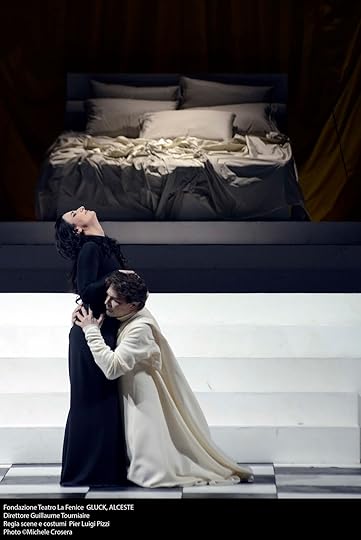
Recording: March 28 2015 - Teatro La Fenice | Venezia
Director: Stéphane Vérité
Duration: 02:31
Casting
Orchestra e Coro del Teatro La Fenice
Guillaume Tourniaire (Conductor)
Pier Luigi Pizzi (Stage Direction)
Carmela Remigio (Soprano) : Alceste
Marlin Miller (Tenor) : Admeto
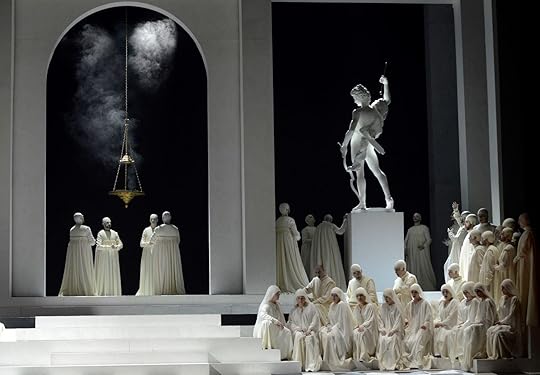
"Alceste, Wq. 37 (the later French version is Wq. 44), is an opera by Christoph Willibald Gluck from 1767. The libretto (in Italian) was written by Ranieri de' Calzabigi and based on the play Alcestis by Euripides. The premiere took place on 26 December 1767 at the Burgtheater in Vienna.
Gluck recomposed and lengthened Alceste to a French libretto by François-Louis Gand Le Bland Du Roullet for performances at the Paris Opera, retaining the three-act structure. Hercules was added as a pivotal character in Act III, as was a scene at the Gates of Hell. The premiere took place on 23 April 1776 in the second Salle du Palais-Royal.
The first British performance, which was sung in Italian, took place at the King's Theatre, London on 30 April 1795."
I watched it via my Medici.tv subscription. (I own a French version with Anne Sophie von Otter and Paul Groves on DVD.)
Lovely music but the the story is rather static and perhaps even long-winded. Not much is going on. The king is dying, he could be saved by a voluntary human sacrifice. Or so the Oracle says. Everybody loves their king but noone is willing to sacrifice their life. The loving wife, Alceste, volunteers. The relationship drama ensues. In the end, deus ex machina resolves everything. End of story.
The Italian version sounded a bit off to me. Might be because I first listened to the French reworked version which is generally regarded as superior.
The staging was black and white, overall elegant. Supposedly followed Gluck's stage notes. Costumes were mostly white with black for Alceste and the Gods/Ghosts in the third act.
Both leading singers, Carmela Remigio and Marlin Miller, were dramatically convincing (which is not always a given in opera). I would have loved for the children to be mute roles like in the french version. Lovely looking kids, but whenever they opened their mouths it was jarring. My favorite part is the long scene between Alceste and Admeto in the second act.
You can watch a brief bit here: https://youtu.be/KrxY01bLPHc?si=XyAq6...
[Marlin Miller sings 'No, crudel' from Gluck's ALCESTE at Teatro La Fenice]
Category: Jane Austen's Pianoforte, 3 points, 2/3/24
Alceste, by Christoph Willibald Gluck (1714 - 1787)
(Vienna version, 1767, in Italian)

Recording: March 28 2015 - Teatro La Fenice | Venezia
Director: Stéphane Vérité
Duration: 02:31
Casting
Orchestra e Coro del Teatro La Fenice
Guillaume Tourniaire (Conductor)
Pier Luigi Pizzi (Stage Direction)
Carmela Remigio (Soprano) : Alceste
Marlin Miller (Tenor) : Admeto

"Alceste, Wq. 37 (the later French version is Wq. 44), is an opera by Christoph Willibald Gluck from 1767. The libretto (in Italian) was written by Ranieri de' Calzabigi and based on the play Alcestis by Euripides. The premiere took place on 26 December 1767 at the Burgtheater in Vienna.
Gluck recomposed and lengthened Alceste to a French libretto by François-Louis Gand Le Bland Du Roullet for performances at the Paris Opera, retaining the three-act structure. Hercules was added as a pivotal character in Act III, as was a scene at the Gates of Hell. The premiere took place on 23 April 1776 in the second Salle du Palais-Royal.
The first British performance, which was sung in Italian, took place at the King's Theatre, London on 30 April 1795."
I watched it via my Medici.tv subscription. (I own a French version with Anne Sophie von Otter and Paul Groves on DVD.)
Lovely music but the the story is rather static and perhaps even long-winded. Not much is going on. The king is dying, he could be saved by a voluntary human sacrifice. Or so the Oracle says. Everybody loves their king but noone is willing to sacrifice their life. The loving wife, Alceste, volunteers. The relationship drama ensues. In the end, deus ex machina resolves everything. End of story.
The Italian version sounded a bit off to me. Might be because I first listened to the French reworked version which is generally regarded as superior.
The staging was black and white, overall elegant. Supposedly followed Gluck's stage notes. Costumes were mostly white with black for Alceste and the Gods/Ghosts in the third act.
Both leading singers, Carmela Remigio and Marlin Miller, were dramatically convincing (which is not always a given in opera). I would have loved for the children to be mute roles like in the french version. Lovely looking kids, but whenever they opened their mouths it was jarring. My favorite part is the long scene between Alceste and Admeto in the second act.
You can watch a brief bit here: https://youtu.be/KrxY01bLPHc?si=XyAq6...
[Marlin Miller sings 'No, crudel' from Gluck's ALCESTE at Teatro La Fenice]
Category: Jane Austen's Pianoforte, 3 points, 2/3/24
Jane Austen July
✔1. Read one of Jane Austen’s main six novels
Sense and Sensibility
✔2. Read something by Jane Austen that is not one of her main six novels
Love and Freindship
✔3. Read a non-fiction work about Jane Austen or her time
Penguin Critical Studies: Sense and Sensibility by Isobel Armstrong
::in progress:: 4. Read a retelling of a Jane Austen book OR a work of historical fiction set in Jane Austen’s time
The Year in Between: A Sense and Sensibility Variation by Christina Morland
✔5. Read a book by a contemporary of Jane Austen (ie, published between 1775–1817)
The Man of Feeling by Henry MacKenzie (First published in 1761, so before she was born. Austen was likely influenced by the book writing S&S, so I count that)
✔6. Watch a direct screen adaptation of a Jane Austen book
Sense and Sensibility (1971 BBC miniseries)
✔7. Watch a modern screen adaptation/retelling of a Jane Austen book
Marianne (2014 indie movie)
Scents and Sensibility (2011 "hallmark movie")
Material Girls DNF (2006 teen movie)
Paul Gordon's Sense and Sensibility (2015 musical)
I read about 30 articles on JASNA website (Persuasions and Persuasions Online)
Listened to S&S related podcasts @ The Thing About Austen
✔1. Read one of Jane Austen’s main six novels
Sense and Sensibility
✔2. Read something by Jane Austen that is not one of her main six novels
Love and Freindship
✔3. Read a non-fiction work about Jane Austen or her time
Penguin Critical Studies: Sense and Sensibility by Isobel Armstrong
::in progress:: 4. Read a retelling of a Jane Austen book OR a work of historical fiction set in Jane Austen’s time
The Year in Between: A Sense and Sensibility Variation by Christina Morland
✔5. Read a book by a contemporary of Jane Austen (ie, published between 1775–1817)
The Man of Feeling by Henry MacKenzie (First published in 1761, so before she was born. Austen was likely influenced by the book writing S&S, so I count that)
✔6. Watch a direct screen adaptation of a Jane Austen book
Sense and Sensibility (1971 BBC miniseries)
✔7. Watch a modern screen adaptation/retelling of a Jane Austen book
Marianne (2014 indie movie)
Scents and Sensibility (2011 "hallmark movie")
Material Girls DNF (2006 teen movie)
Paul Gordon's Sense and Sensibility (2015 musical)
I read about 30 articles on JASNA website (Persuasions and Persuasions Online)
Listened to S&S related podcasts @ The Thing About Austen
Watched
Paul Gordon's Emma (2018) @ https://www.youtube.com/watch?v=-9Kdm...
Cast and Credits
Kelli Barrett as Emma Woodhouse
Timothy Gulan as Mr. Knightley
Dani Marcus as Harriet Smith
Lauren Cohn as Miss Bates
Brian Herndon as Mr. Elton
Richert Easley as Mr. Woodhouse
Sharon Reitkerk as Jane Fairfax
Will Reynolds as Frank Churchill
Adam Daveline as Robert Martin
Don Richard as Mr. Weston
Pamela Winslow Kashani as Mrs. Weston
Caitlin Brooke as Mrs. Elton / Mrs. Bates / Katherine Martin
Tim Kashani Director
Kent Nicholson Director
Wendy Seyb Choreographer & Associate Director
Alice Brooks Director of Photography
Dara Wishingrad Production Designer
Paul Gordon's Emma (2018) @ https://www.youtube.com/watch?v=-9Kdm...
Cast and Credits
Kelli Barrett as Emma Woodhouse
Timothy Gulan as Mr. Knightley
Dani Marcus as Harriet Smith
Lauren Cohn as Miss Bates
Brian Herndon as Mr. Elton
Richert Easley as Mr. Woodhouse
Sharon Reitkerk as Jane Fairfax
Will Reynolds as Frank Churchill
Adam Daveline as Robert Martin
Don Richard as Mr. Weston
Pamela Winslow Kashani as Mrs. Weston
Caitlin Brooke as Mrs. Elton / Mrs. Bates / Katherine Martin
Tim Kashani Director
Kent Nicholson Director
Wendy Seyb Choreographer & Associate Director
Alice Brooks Director of Photography
Dara Wishingrad Production Designer
-listening to
The Genius of Jane Austen: Her Love of Theatre and Why She Works in Hollywood by Paula Byrne
Loving it so far.
- bought Austentatious (a recorded porformance) - gonna watch it later in the year
The Genius of Jane Austen: Her Love of Theatre and Why She Works in Hollywood by Paula Byrne
Loving it so far.
- bought Austentatious (a recorded porformance) - gonna watch it later in the year
- finished The Genius of Jane Austen: Her Love of Theatre and Why She Works in Hollywood - really enjoyed it. Bought myself a bunch of 18th century plays.
- reading/listening to
The Rivals by Richard Brinsley Sheridan
- reading/listening to
The Rivals by Richard Brinsley Sheridan
I just noticed I never added Hallmark's Sense and Sensibility (2024) which I watched earlier this year when it came out.
I finished The Rivals by Richard Brinsley Sheridan.
(Mrs Malaprop is a hoot)
Watched Mansfield Park starring Billie Piper.
Not a fan of the cuts (No ball, no Portsmouth visit). As much as I like Billie she was miscast. The Crawford siblings were my favorite performances in the movie (especially Hailey Atwell as Mary). Hair and make up - atrocious.
Reading The Hapless Milliner by Jessica Bull (Miss Austen Investigates #1).
(Mrs Malaprop is a hoot)
Watched Mansfield Park starring Billie Piper.
Not a fan of the cuts (No ball, no Portsmouth visit). As much as I like Billie she was miscast. The Crawford siblings were my favorite performances in the movie (especially Hailey Atwell as Mary). Hair and make up - atrocious.
Reading The Hapless Milliner by Jessica Bull (Miss Austen Investigates #1).
Books mentioned in this topic
The Hapless Milliner (other topics)The Genius of Jane Austen: Her Love of Theatre and Why She Works in Hollywood (other topics)
The Rivals (other topics)
The Genius of Jane Austen: Her Love of Theatre and Why She Works in Hollywood (other topics)
The Year in Between: A Sense and Sensibility Variation (other topics)
More...



